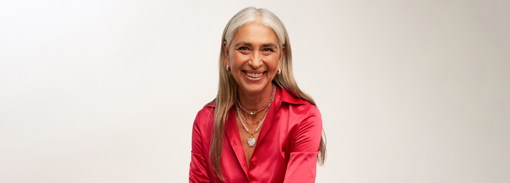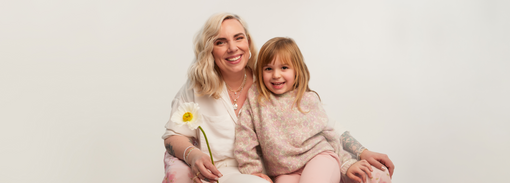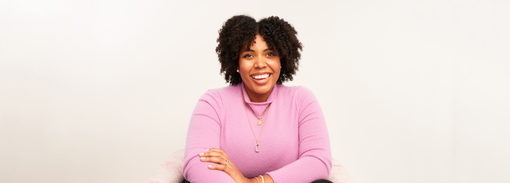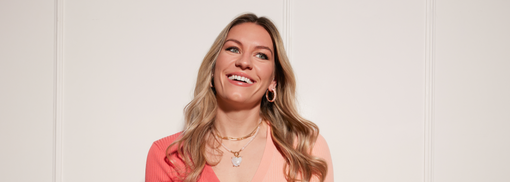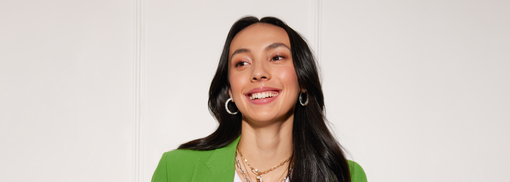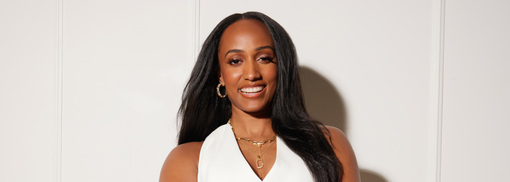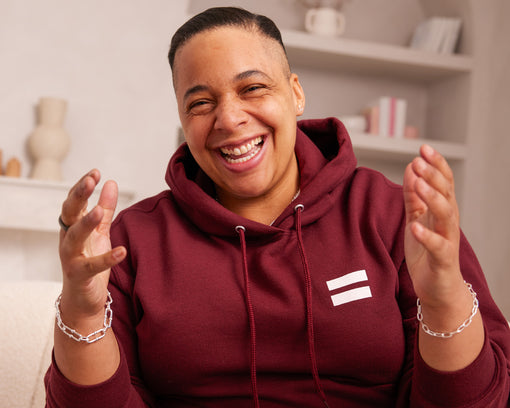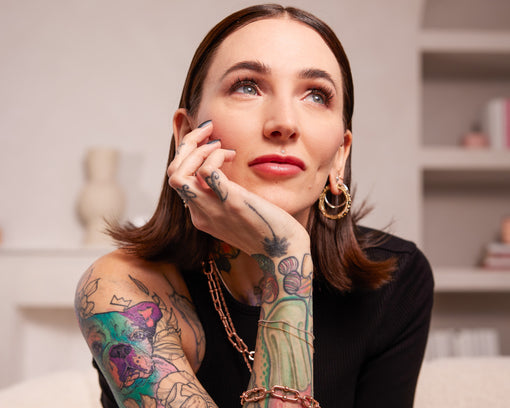
- Article published at:
H&B started at Rachel’s kitchen table in Regina, Saskatchewan. So naturally, we love an unexpected success story. Enter our ideal collaborator and the face of our Team Canada Collection, Maïa Schwinghammer—Canadian Freestyle Moguls Skier. Her journey started on the flatlands of the prairies, being towed on skis behind her dad’s snowmobile. Now she’s headed to represent Canada on the world's biggest stage and compete at the Winter Olympic Games in Milano Cortina 2026. We met up to talk with Maïa about jewellery, painting, personal style, moguls skiing, and of course, Doechii. Let’s get to know her.
Tell us a bit about where you grew up and how you got into skiing.I grew up in Saskatoon, Saskatchewan, which is about as flat as it gets! The first time I ever skied was actually behind a snowmobile on Christopher Lake. My parents managed a little ski hill just south of Saskatoon called Mount Blackstrap. It wasn’t exactly a mountain—only 45 meters of elevation, one chairlift, and one T-bar, but it was the perfect place to learn. My brother, sister, and I had total freedom to ski all day, and that’s really where I fell in love with the sport.
What inspired you to pursue freestyle skiing competitively?My dad worked in freestyle skiing and used to take me along to events. I got to watch my idols compete, which sparked my dream of becoming an athlete. But the real “aha” moment came when I was eight years old at the 2010 Vancouver Olympics. Watching the opening ceremonies and eventually seeing Jennifer Heil win silver. I just remember standing on a chair thinking, I want to be down there one day.
Representing my country on the world stage has been my dream since I was a kid, and I feel incredibly lucky to be living it.
Growing up in Saskatchewan is an unconventional path for a skier. How did your community shape your journey?Coming from a province without big mountains or ski resorts definitely made logistics more difficult. But the support from home has meant everything. Saskatchewan has this incredible sense of community. People really rally around their athletes, and to feel that hometown love and support as an athlete makes all the difference.
Can you tell us about your first big win?My first World Cup win was at home in Val-Saint-Côme, Quebec—and it was also an Olympic qualifier. I had just won the first round, and when you win the first round, you drop in last for the final round. So, standing at the top, hearing the crowd cheer, and realizing they were cheering for me gave me so much energy. When I crossed the finish line and saw my score—I’m getting chills just thinking about it. Winning my first World Cup at home in Canada was a truly incredible experience.
I really like H&B because it’s almost similar to moguls, where there is kind of an intensity and effortlessness. You get these statement pieces and bold colours, but it’s super elegant.
What do you love most about mogul skiing?Mogul skiing combines everything—technique, speed, and creativity. You need the full package. What I love most is making something so intense look effortless. It’s like a performing art; the goal is to make it look beautiful and effortless, even though it’s incredibly technical.
Speaking of art, you’re also a painter. How does that fit into your life as an athlete?Art has always been part of my life. I love drawing and painting. It’s an escape from the hectic life of training and travel. Painting helps me disconnect from the outside world and reconnect with myself. I paint intuitively, with feeling rather than a plan, and that flow state really helps my skiing too.
How do you stay grounded and focused in competition?For me, it’s all about presence and gratitude. I remind myself how lucky I am to be doing what I love. My favourite quote is, “What a blessing it is to be challenged in a pursuit of your own choosing.” I live by that. That mindset helps keep me centred and performing my best.
People really rally around their athletes, and to feel that hometown love and support as an athlete makes all the difference.
What’s your go-to hype song before competing?Paper Planes by M.I.A. has always been a classic for me, but lately, the girls and I have been obsessed with Doechii. Her album gets everyone at the gym fired up.
How would you describe your personal style?I love a mix of simplicity and statement, something elegant but with a pop of colour or boldness. On the hill, we don’t have much freedom with our uniforms, so I add little touches—a bright bandana, a fun ponytail, or some statement earrings.
I really like H&B because it’s almost similar to moguls, where there is kind of an intensity and effortlessness. You get these statement pieces and bold colours, but it’s super elegant. The Sparkle Hoops are my favourite right now; they pack a punch, but are also beautiful and refined.
What does representing Canada mean to you?It means everything. Growing up a prairie girl and now heading to the Olympics as a skier, it’s an unexpected path, but I’m so proud. Representing my country on the world stage has been my dream since I was a kid, and I feel incredibly lucky to be living it.
My favourite quote is, 'What a blessing it is to be challenged in a pursuit of your own choosing.' I live by that.
Paint us your dream ski day.Easy. Bluebird pow day, with at least 20 centimetres of fresh snow, a latte and croissant to start, ski all day, and finish with an Aperol spritz on a sunny patio. Maybe we’re in Europe. Yeah, that’s my ideal day.
Shop the Team Canada Collection
Learn More
